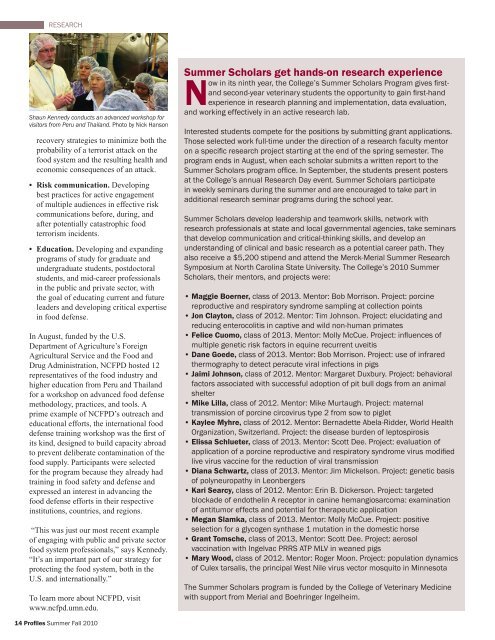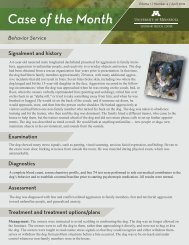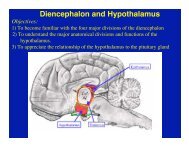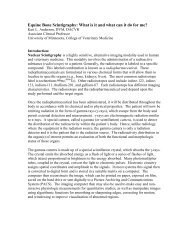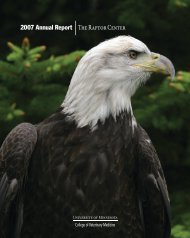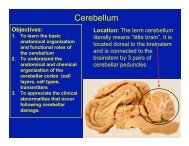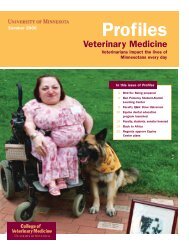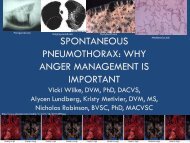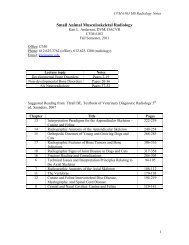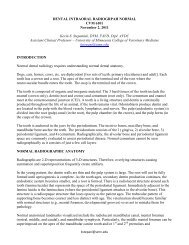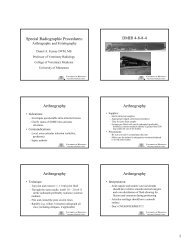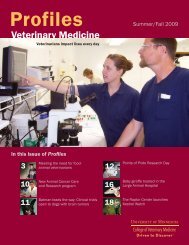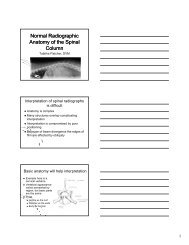Summer/Fall 2010 PDF Version - University of Minnesota College of ...
Summer/Fall 2010 PDF Version - University of Minnesota College of ...
Summer/Fall 2010 PDF Version - University of Minnesota College of ...
You also want an ePaper? Increase the reach of your titles
YUMPU automatically turns print PDFs into web optimized ePapers that Google loves.
RESEARCH<br />
Shaun Kennedy conducts an advanced workshop for<br />
visitors from Peru and Thailand. Photo by Nick Hanson<br />
recovery strategies to minimize both the<br />
probability <strong>of</strong> a terrorist attack on the<br />
food system and the resulting health and<br />
economic consequences <strong>of</strong> an attack.<br />
• Risk communication. Developing<br />
best practices for active engagement<br />
<strong>of</strong> multiple audiences in effective risk<br />
communications before, during, and<br />
after potentially catastrophic food<br />
terrorism incidents.<br />
• Education. Developing and expanding<br />
programs <strong>of</strong> study for graduate and<br />
undergraduate students, postdoctoral<br />
students, and mid-career pr<strong>of</strong>essionals<br />
in the public and private sector, with<br />
the goal <strong>of</strong> educating current and future<br />
leaders and developing critical expertise<br />
in food defense.<br />
In August, funded by the U.S.<br />
Department <strong>of</strong> Agriculture’s Foreign<br />
Agricultural Service and the Food and<br />
Drug Administration, NCFPD hosted 12<br />
representatives <strong>of</strong> the food industry and<br />
higher education from Peru and Thailand<br />
for a workshop on advanced food defense<br />
methodology, practices, and tools. A<br />
prime example <strong>of</strong> NCFPD’s outreach and<br />
educational efforts, the international food<br />
defense training workshop was the first <strong>of</strong><br />
its kind, designed to build capacity abroad<br />
to prevent deliberate contamination <strong>of</strong> the<br />
food supply. Participants were selected<br />
for the program because they already had<br />
training in food safety and defense and<br />
expressed an interest in advancing the<br />
food defense efforts in their respective<br />
institutions, countries, and regions.<br />
“This was just our most recent example<br />
<strong>of</strong> engaging with public and private sector<br />
food system pr<strong>of</strong>essionals,” says Kennedy.<br />
“It’s an important part <strong>of</strong> our strategy for<br />
protecting the food system, both in the<br />
U.S. and internationally.”<br />
To learn more about NCFPD, visit<br />
www.ncfpd.umn.edu.<br />
<strong>Summer</strong> Scholars get hands-on research experience<br />
Now in its ninth year, the <strong>College</strong>’s <strong>Summer</strong> Scholars Program gives fi rstand<br />
second-year veterinary students the opportunity to gain fi rst-hand<br />
experience in research planning and implementation, data evaluation,<br />
and working effectively in an active research lab.<br />
Interested students compete for the positions by submitting grant applications.<br />
Those selected work full-time under the direction <strong>of</strong> a research faculty mentor<br />
on a specifi c research project starting at the end <strong>of</strong> the spring semester. The<br />
program ends in August, when each scholar submits a written report to the<br />
<strong>Summer</strong> Scholars program <strong>of</strong>fi ce. In September, the students present posters<br />
at the <strong>College</strong>’s annual Research Day event. <strong>Summer</strong> Scholars participate<br />
in weekly seminars during the summer and are encouraged to take part in<br />
additional research seminar programs during the school year.<br />
<strong>Summer</strong> Scholars develop leadership and teamwork skills, network with<br />
research pr<strong>of</strong>essionals at state and local governmental agencies, take seminars<br />
that develop communication and critical-thinking skills, and develop an<br />
understanding <strong>of</strong> clinical and basic research as a potential career path. They<br />
also receive a $5,200 stipend and attend the Merck-Merial <strong>Summer</strong> Research<br />
Symposium at North Carolina State <strong>University</strong>. The <strong>College</strong>’s <strong>2010</strong> <strong>Summer</strong><br />
Scholars, their mentors, and projects were:<br />
• Maggie Boerner, class <strong>of</strong> 2013. Mentor: Bob Morrison. Project: porcine<br />
reproductive and respiratory syndrome sampling at collection points<br />
• Jon Clayton, class <strong>of</strong> 2012. Mentor: Tim Johnson. Project: elucidating and<br />
reducing enterocolitis in captive and wild non-human primates<br />
• Felice Cuomo, class <strong>of</strong> 2013. Mentor: Molly McCue. Project: infl uences <strong>of</strong><br />
multiple genetic risk factors in equine recurrent uveitis<br />
• Dane Goede, class <strong>of</strong> 2013. Mentor: Bob Morrison. Project: use <strong>of</strong> infrared<br />
thermography to detect peracute viral infections in pigs<br />
• Jaimi Johnson, class <strong>of</strong> 2012. Mentor: Margaret Duxbury. Project: behavioral<br />
factors associated with successful adoption <strong>of</strong> pit bull dogs from an animal<br />
shelter<br />
• Mike Lilla, class <strong>of</strong> 2012. Mentor: Mike Murtaugh. Project: maternal<br />
transmission <strong>of</strong> porcine circovirus type 2 from sow to piglet<br />
• Kaylee Myhre, class <strong>of</strong> 2012. Mentor: Bernadette Abela-Ridder, World Health<br />
Organization, Switzerland. Project: the disease burden <strong>of</strong> leptospirosis<br />
• Elissa Schlueter, class <strong>of</strong> 2013. Mentor: Scott Dee. Project: evaluation <strong>of</strong><br />
application <strong>of</strong> a porcine reproductive and respiratory syndrome virus modifi ed<br />
live virus vaccine for the reduction <strong>of</strong> viral transmission<br />
• Diana Schwartz, class <strong>of</strong> 2013. Mentor: Jim Mickelson. Project: genetic basis<br />
<strong>of</strong> polyneuropathy in Leonbergers<br />
• Kari Searcy, class <strong>of</strong> 2012. Mentor: Erin B. Dickerson. Project: targeted<br />
blockade <strong>of</strong> endothelin A receptor in canine hemangiosarcoma: examination<br />
<strong>of</strong> antitumor effects and potential for therapeutic application<br />
• Megan Slamka, class <strong>of</strong> 2013. Mentor: Molly McCue. Project: positive<br />
selection for a glycogen synthase 1 mutation in the domestic horse<br />
• Grant Tomsche, class <strong>of</strong> 2013, Mentor: Scott Dee. Project: aerosol<br />
vaccination with Ingelvac PRRS ATP MLV in weaned pigs<br />
• Mary Wood, class <strong>of</strong> 2012. Mentor: Roger Moon. Project: population dynamics<br />
<strong>of</strong> Culex tarsalis, the principal West Nile virus vector mosquito in <strong>Minnesota</strong><br />
The <strong>Summer</strong> Scholars program is funded by the <strong>College</strong> <strong>of</strong> Veterinary Medicine<br />
with support from Merial and Boehringer Ingelheim.<br />
14 Pr<strong>of</strong>iles <strong>Summer</strong> <strong>Fall</strong> <strong>2010</strong>


